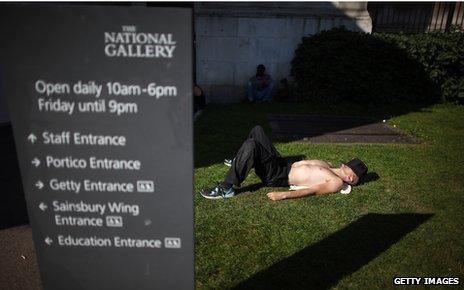How to sleep in hot weather
- Published

When night-time temperatures stay as high as some summer days, many people find it hard to get to sleep. So what's the best way to drift off on sticky nights?
Humidity is a big part of the problem, making it hard for sweat to evaporate.
In places like the US, where powerful air conditioning units are reasonably common in houses in hot and humid areas, it's not so much of a concern.
But in places like the UK where it's hot and humid less frequently how should people ensure they get a good night's sleep?
Weather expert Philip Eden recommends a technique common in Mediterranean countries.
"I make sure all the curtains are closed during the daytime to stop the sun coming in. I have the windows open on the shady side and closed on the sunny side. It means running round the house halfway through the day to close one side and open the other."
An hour before going to bed he opens all the windows to get a through breeze.
But not everyone has the luxury of being able to throw open windows. It may not be safe. Bungalows, ground floor flats and basements can be vulnerable to burglary. Others may worry about insect bites, particularly with the spread of mosquitos in the UK.
"The most sensible option is to use a [electric] fan," recommends Mary Morrell, professor of sleep and respiratory physiology at Imperial College London. "It will help move the air around your body and increase the chance of sweat evaporating."
She recommends thin cotton sheets rather than nylon bedding. They will absorb sweat rather than leave the sleeper covered in a film of moisture.
Insects are unlikely to bother people in cities, she believes. But for those in the countryside with the windows open, a mosquito net is one possible solution.
There's more to it than temperature and humidity, says Prof Kevin Morgan, director of the Clinical Sleep Research Unit at Loughborough University.
Hot days mean we get into bed in a different physical and mental state. Often people have drunk more alcohol than usual. And when it comes to sleep, a different routine or state of mind is not good, he says.
"It's hot and you get into bed and don't get to sleep as quickly. The thing that stops you falling asleep is what you then start thinking about. Don't lie there thinking about why you didn't get that promotion. It's a recipe for mini insomnia."
Instead, get up and read the paper or do something comforting as long as it doesn't involve turning on an email or computer, he advises.
A nightcap is not recommended unless it's something you do normally.
"If you're used to having a couple of glasses of claret and that works for you, fine," Morgan says. "But don't have a toddy if you're not used to it. Alcohol is pretty good at putting you to sleep but pretty awful at keeping you asleep."

Catching up on sleep later in the day may be necessary for some
Nor is a cold shower a good idea. "It will make you feel momentarily cold and close down the pores so you'll sweat less. If you have to shower, have a lukewarm one."
The key thing is not to worry. Healthy humans can do with two poor nights' sleep in a row without any significant impact, Morgan says.
"And by the third night you'll be so tired that you'll fall asleep quickly whatever the weather."